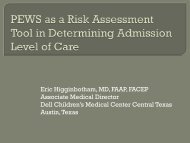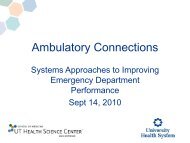COD E R E D
Download - Code Red: The Critical Condition of Health in Texas
Download - Code Red: The Critical Condition of Health in Texas
- No tags were found...
You also want an ePaper? Increase the reach of your titles
YUMPU automatically turns print PDFs into web optimized ePapers that Google loves.
physiological reactions to them. Differences in life experiences are strongly conditioned by educationalachievement. The concept of allostatic load, with its implication of general susceptibility, has the ability toexplain the educational gradient observed in a wide range of diseases and causes of deaths.Allostatic load has been measured by levels of physiological activity across the hypothalamicpituitary-adrenalaxis, the sympathetic nervous system, cardiovascular systems, and metabolic processes,which have been linked to increased risk for disease (McEwen, 1998; Seeman T. E. et al., 2004). There isstrong evidence of a negative relationship between allostatic load and educational attainment, with thebetter educated exhibiting lower cumulative allostatic load, and of a positive relationship between allostaticload and mortality (Seeman T. E. & Crimmins, 2001; Seeman T. E. et al., 2004; Seeman T. E. et al., 1997;Seeman T. E. et al., 2001). In a study of elderly Americans from new Haven, CT, East Boston, MA, andDurham, NC, the cumulative allostatic load explained 35% of the differences in mortality risk betweenthose with less than high school and those with high school or greater educational achievement (SeemanT. E. et al., 2004).Education and Age. The advantages in health associated with education do not decline with age(Crimmins & Saito, 2001; Manton et al., 1997; Mirowsky & Ross, 2003; Preston & Elo, 1995). On thecontrary, the positive effects of education on health accumulate during adulthood over many areas of life(socioeconomic, behavioral and biological) and grow over long periods of time (Mirowsky & Ross, 2003).The positive accumulations create feedbacks that amplify the effects of education over the lifetime. Evenamong the oldest old, those with less education have the greatest disability and limitations (Freedman etal., 2002). Declines in severe cognitive impairment appeared to be largest among those with less than ahigh school education, though there were no educational disparities in functional limitations and visuallimitations (Freedman et al., 2002). The concept of cumulative biological risk discussed above can beused to explain the evidence that educational related mortality differentials grow at older ages. Thecumulative burden of physiological deregulation, as reflected in the summary measure of allostatic load,increases faster over the lifetime for those with less education compared to those who are better educated(Seeman T. E. et al., 2004).Section 4. Alternative Views on the Link between Educational Attainment and Adult Health StatusReverse Causation. Low (2005) describes an alternative explanation for the correlation betweeneducation and health. Reverse causation, represented by the hypothesis that better health may lead tomore and better education, could explain the relationship between education and health (Low, 2005).While this paper discusses the relationship between health and educational achievement in school agechildren, in adults the preponderance of evidence is that it is education that mainly promotes good healthand not the other way round (Koivusilta et al., 1999; Ross C. E. & Wu, 1996; Shakotko et al., 1980).The Third Factor Hypothesis. Low (2005) describes the third factor hypothesis which posits that botheducation and health depend on some third factor. The factors that are proposed are “personalendowment” and “time preference” (Low, 2005). Personal endowment consists of a cluster of geneticallyinherited factors that predispose to both educational achievement and good health. While there isevidence of genetics component to general intelligence and of an association between IQ, educationalachievement and health, it seems unlikely that inherited IQ alone can account for the observedrelationship between education and health (Low, 2005). Other inherited traits such as personality andlongevity may also affect both educational achievement and health, but evidence is lacking that thosetraits are socially distributed in the population and can explain the health of population groups (Low, 2005).The evidence provided in this paper, on the other hand, indicates that education promotes healthindependently of personal endowment and genetic traits.Time preference, or the ability and inclination to postpone gratification with the expectation offuture benefit, is a concept taken from the economic literature (Fuchs V., 1982). Time preference canaffect both educational attainment and health because those who are able and willing to postponegratification are more likely to stay in school as well as to avoid risky behaviors such as smoking or riskyE-34







